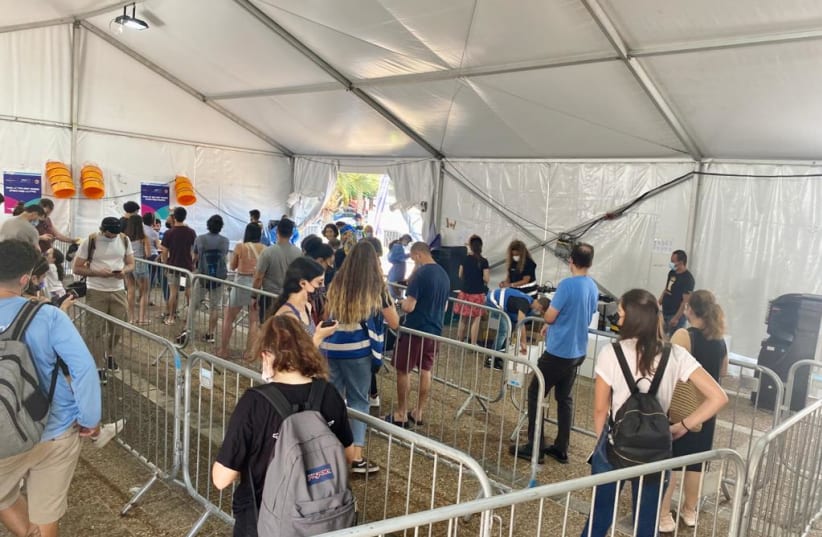A new strain of the Delta variant could force Israel into a lockdown, a health official warned Monday, as Israel surpassed 50,000 active cases, up from fewer than 200 two months ago.
The strain comes from South America and was identified in the US.
“If it reaches Israel, we will get to the lockdown that we so desperately want to avoid,” Dr. Asher Shalmon, director of the Health Ministry’s Department of International Relations, told the Knesset Law and Constitution Committee.
The strain appears to be more contagious and more resistant to the vaccines, he said.
However, Health Ministry Director-General Nachman Ash said full details were not yet available.
“There have been and there will always be variants,” he told KAN Reshet Bet. “I hope they do not reach us, but I do not want to create unnecessary panic. We will have to deal with variants in the future as well.”
If the coronavirus morbidity does not decrease, the beginning of the school year might be postponed, Ash said, adding that there are a limited number of working days in September.
Also on Monday, Prime Minister Naftali Bennett convened a meeting with government officials to discuss how to carry out vaccinations in schools. The issue has generated tension between the Health and Education ministries.
In the meeting, they were expected to discuss a proposal by Education Minister Yifat Shasha-Biton (New Hope) to allow vaccination stations to operate in schools up until the beginning of the school year and then before and after school hours once school resumes.
Shasha-Biton has opposed carrying out a vaccination campaign in schools, saying students should be able to feel in a protected environment where things are back to normal and to focus on their studies after the disruption caused by the pandemic.
Health Minister Nitzan Horowitz (Meretz) says a vaccination campaign in schools is the best way to increase the number of young people vaccinated, which he believes is crucial to stop a new wave in a time of emergency.
The vaccination rate among children who have already turned 12 is about 30%, in the cohort 13-15 it is around 42%, and among those ages 16-19 it is close to 70%, the Health Ministry reported.
Bennett reportedly asked Shasha-Biton to take responsibility for the vaccination of schoolchildren.
Meanwhile, the new system of travel restrictions came into effect on Monday. All inbound travelers are now required to self-isolate even if they are vaccinated or recovered unless they come from a selected list of yellow countries. Under the previous system, nations that required quarantine had to be explicitly mentioned and approved.
At the moment, the list of yellow countries includes Hong Kong, Hungary, Taiwan, Moldova, New Zealand, China, Singapore and the Czech Republic.
Most countries were taken off the group of red countries, where Israelis cannot travel unless they obtain permission from the government Exceptions Committee, which also requires self-isolation for returnees.
As of Monday, the red list included Bulgaria, Brazil, Georgia, Mexico, Spain and Turkey.
Full isolation in Israel lasts two weeks, which can be shortened to seven days with two negative PCR tests.
In addition, beginning on Wednesday, the Green Pass system will be expanded to all activities and venues except for malls and stores, for which the Purple Ribbon outline will be brought back, allowing a maximum of one person per seven square meters. Stores smaller than 100 sq.m. will be exempt.
Under the Green Pass system, only individuals who are vaccinated, have recovered or have undergone a rapid test in the previous 24 hours will be entitled to enter certain venues.
Late on Sunday, the Health Ministry announced new capacity limits for event halls, capping the number of guests they can welcome to 400 indoors and 500 outdoors.
The decision was made earlier in the day by an interministerial committee, not the coronavirus committee, and would come into effect next Sunday, August 22, the ministry said in a statement.
Some 5,075 new cases were recorded on Sunday, and more than 6% of the people screened tested positive, the highest since February, the Health Ministry reported.
During weekdays last week, there were about 6,000 cases a day, but with a higher number of tests. Data from Sunday is still influenced by the weekend, when fewer tests are taken and processed.
There were 531 patients in serious condition on Sunday, up slightly from the previous day. The authorities hope the third vaccine shot will lead to a decrease in serious morbidity in the coming days.
On Monday, Israel hit the milestone of one million people inoculated with the third shot, the Prime Minister’s Office and the Health Ministry said in a joint statement shortly after Pfizer announced it had submitted initial data from the early-stage trial of the coronavirus vaccine booster shot to the US Food and Drug Administration.
Currently, Israel is the only country in the world administering a booster to a vast segment of its population, all individuals over 50. In some countries, including the US, a booster is offered to immunosuppressed patients with specific preexisting conditions.
The authorities chose to move quickly as the immunity appeared to wane in the elderly who were fully vaccinated as early as mid-January.
According to the findings of the Phase I trial presented by Pfizer, individuals who received a third shot presented a significantly higher number of antibodies than after the first two inoculations: five times higher in those aged 18-55 and 11 times higher in those aged 65-85.
The participants were vaccinated eight or nine months after they had completed their first two inoculations.
The booster was also found to have a high level of tolerability.
The results of a Phase III trial will be submitted soon to the FDA, the European Medicines Agency and other international bodies, Pfizer said.
